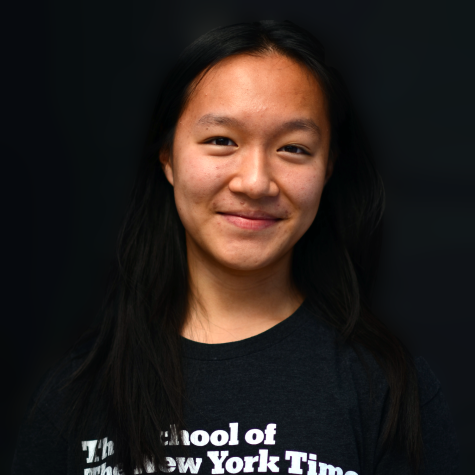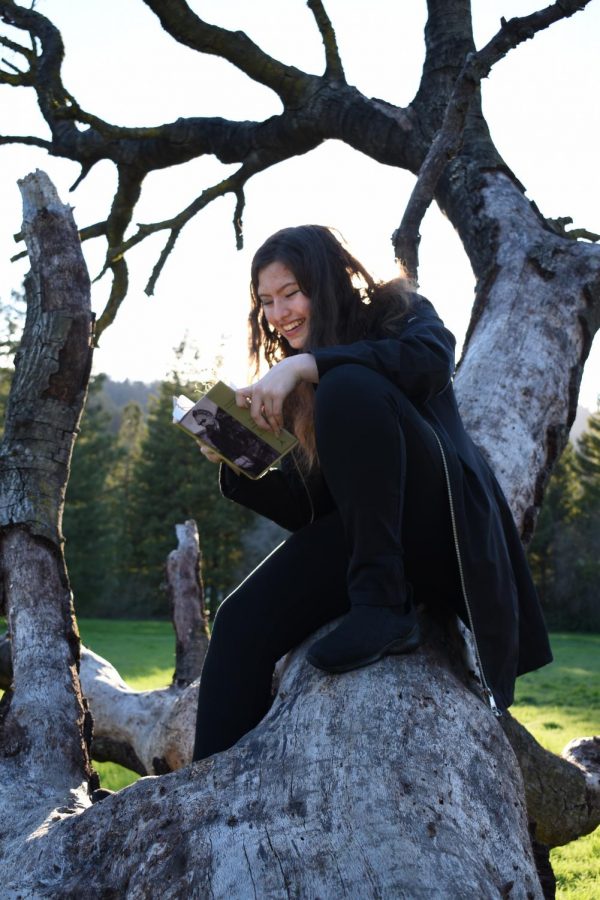Humans of Harker: A beautiful blend of philosophy and fiction
Sophia Gottfried explores the mutualistic relationship between the real world and philosophical systems
“Philosophy and fiction make a beautiful couple. There are a lot of philosophers who are notoriously dry, but their ideas are incredibly interesting. If you can package those ideas in a more digestible and more interesting way, then why wouldn’t you? I often try and aim to do that. Humans are creatures of stories, they’d rather have a story of that idea put into action, and that’s the beauty of how fiction serves philosophy,” Sophia Gottfried (12) said.
Sophia Gottfried (12) hoards tiny notebooks. These thin, worn journals, collected from a local library over the years, frequent the depths of her iconic black trench coat pocket. Hasty left-handed scribbles decorate their pages, from elaborate descriptions of a quaint scene that may inspire a burst of creative writing later to funny, absurd quotes pinched from mundane lunch conversations with peers. Most of all, her philosophical musings — jotted threads of thought to contemplate further — are tucked away in these papers.
From the continental tradition of Friedrich Nietzsche to the ponderings of the ancient Aztecs, Sophia’s extensive knowledge of philosophy is now a well-known aspect of her life. Yet, Sophia had strictly followed an empiricist mindset only years before. It was through a seemingly unusual pathway — martial arts — that she first began exploring philosophy.
“I did a lot of martial arts when I was younger, and they had us read things like Sun Tzu’s The Art of War and Musashi Miyamoto’s The Book of Five Rings, which are strategy manuals, but they have a lot of philosophy in them and that was my pathway into philosophy,” Sophia said. “A combination of various philosophies took me out of that ‘science is the way to truth and there is nothing meaningful in the world,’ nihilistic attitude that I had in middle school.”
After exploring various different types of philosophies, from stoicism to the French existentialists, Sophia now self-identifies as an affirmative nihilist. Her own personal work focuses on the idea of nothingness and the self.
“People are created both by gaps and actual substantive things. For example, any Harker student is as much a Harker student as the fact that they didn’t decide to go to any other school,” Sophia said. “We have to acknowledge the closed doors and what could have been in order to gain conceptual understanding of the self. That’s my main point with nothingness.”
While developing her own unique branch of philosophy, Sophia also seeks to make the field more accessible to others through translating its concepts in an engaging and appealing way. She applies her knack for storytelling into both philosophical and creative writing.
“Philosophy and fiction make a beautiful couple. There are a lot of philosophers who are notoriously dry, but their ideas are incredibly interesting. If you can package those ideas in a more digestible and more interesting way, then why wouldn’t you? I often try and aim to do that,” Sophia said. “Humans are creatures of stories, they’d rather have a story of that idea put into action, and that’s the beauty of how fiction serves philosophy.”
Fellow writer and close friend since freshman year Vivian Jin (12) values Sophia’s caring nature and reflects on their discussions, whether it be about writing ideas or philosophical thoughts.
“She has a great capacity for love of people around her, and she really shows that with her mental dedication to people,” Vivian said. “We’re both writers, and she’s always willing to read over something that I write. It’s great to have someone who is willing to talk about something so abstract and existential for so long and have that support as well.”
Sophia shares her ideas with peers in various different ways as well. She not only writes for journals and participates in reading groups but also launched the Philosophy Club’s conferences to new levels as president of the club, garnering nearly 200 participants and hosting several guest speakers in contrast to the average 60 attendees in previous philosophy conferences.
Club adviser and English teacher Charles Shuttleworth admires not only her intellectual curiosity but also her ability to spread enthusiasm among her community.
“Her ideas are really advanced and sophisticated and she’s very dynamic in the sense that she’s also finding practical applications for it. That’s where she’s getting more student involvement. They’re taking movies like The Matrix and talking about the philosophical elements in very sophisticated terms, but with a base that everybody can relate to,” Shuttleworth said.
Her love of learning creates a positive, nurturing environment for her peers. Close friend Elliot Kampmeier (12), who has known Sophia since freshman year, appreciates her willingness to help others.
“She’s incredibly sweet and caring and wanted to get to know people very well and wanted to help them out but wasn’t stuck up or in your face about the things that she knew,” Elliot said. “Sometimes, you get the impression of people that are really smart that they’ll push their knowledge on you all the time. She was nothing like that at all. She was happy to help out with homework and genuinely very kind.”
Outside of using philosophy as a way of connecting with others, Sophia also finds applications of philosophical concepts in her own understanding of her life as well.
“I’m very much into having a mutualistic relationship between the real world and the world of philosophy. I like philosophical systems that acknowledge the role of randomness in our lives, ones that are a little bit messier because that coincides with my experiences as a human being,” Sophia said.
Randomness has greatly impacted Sophia’s life, from the music that she enjoys to the courses she has taken in high school. She credits randomness to her decision to enroll at Harker.
“If you told middle school me that I would be going to a private school, I would have been like, ‘Pfft, no.’ I think [coming to Harker] is one big random event that completely changed my life course,” Sophia said. “I’ve been profoundly shaped by randomness in a number of very strange ways. I’ve gleaned interests from going down complete rabbit holes, or [I’ve met] friends that I would not have met if I had been a second later.”
Viewing her various life experiences through a philosophical lens, Sophia emphasizes the importance of being exposed to multiple viewpoints. Whether through creative or philosophical writing, she hopes to continue paving her own unique way amid the great philosophers.
“I vibe a lot with perspectivism, which is the idea that truth depends on perspectives. Someone who seeks the truth tries to look at as many people’s ideas as possible,” Sophia said. “Some of them you will reject. When I say look at every idea, that doesn’t mean accept every idea, but I’m trying not to fall into dogma, so I’m experimenting with a lot of ideas and trying to put out my own thoughts into the world.”

Erica Cai (12) is the co-editor-in-chief of Humans of Harker, and this is her fourth year on staff. Her goals in journalism this year are to celebrate...


















![“[Building nerf blasters] became this outlet of creativity for me that hasn't been matched by anything else. The process [of] making a build complete to your desire is such a painstakingly difficult process, but I've had to learn from [the skills needed from] soldering to proper painting. There's so many different options for everything, if you think about it, it exists. The best part is [that] if it doesn't exist, you can build it yourself," Ishaan Parate said.](https://harkeraquila.com/wp-content/uploads/2022/08/DSC_8149-900x604.jpg)




![“When I came into high school, I was ready to be a follower. But DECA was a game changer for me. It helped me overcome my fear of public speaking, and it's played such a major role in who I've become today. To be able to successfully lead a chapter of 150 students, an officer team and be one of the upperclassmen I once really admired is something I'm [really] proud of,” Anvitha Tummala ('21) said.](https://harkeraquila.com/wp-content/uploads/2021/07/Screen-Shot-2021-07-25-at-9.50.05-AM-900x594.png)







![“I think getting up in the morning and having a sense of purpose [is exciting]. I think without a certain amount of drive, life is kind of obsolete and mundane, and I think having that every single day is what makes each day unique and kind of makes life exciting,” Neymika Jain (12) said.](https://harkeraquila.com/wp-content/uploads/2017/06/Screen-Shot-2017-06-03-at-4.54.16-PM.png)








![“My slogan is ‘slow feet, don’t eat, and I’m hungry.’ You need to run fast to get where you are–you aren't going to get those championships if you aren't fast,” Angel Cervantes (12) said. “I want to do well in school on my tests and in track and win championships for my team. I live by that, [and] I can do that anywhere: in the classroom or on the field.”](https://harkeraquila.com/wp-content/uploads/2018/06/DSC5146-900x601.jpg)
![“[Volleyball has] taught me how to fall correctly, and another thing it taught is that you don’t have to be the best at something to be good at it. If you just hit the ball in a smart way, then it still scores points and you’re good at it. You could be a background player and still make a much bigger impact on the team than you would think,” Anya Gert (’20) said.](https://harkeraquila.com/wp-content/uploads/2020/06/AnnaGert_JinTuan_HoHPhotoEdited-600x900.jpeg)

![“I'm not nearly there yet, but [my confidence has] definitely been getting better since I was pretty shy and timid coming into Harker my freshman year. I know that there's a lot of people that are really confident in what they do, and I really admire them. Everyone's so driven and that has really pushed me to kind of try to find my own place in high school and be more confident,” Alyssa Huang (’20) said.](https://harkeraquila.com/wp-content/uploads/2020/06/AlyssaHuang_EmilyChen_HoHPhoto-900x749.jpeg)



